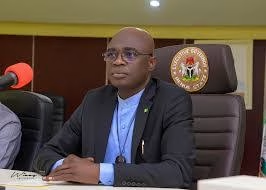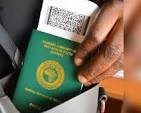
Benue’s War Within: Governor Alia Launches Quick Response Squad to Combat Insecurity A Real Solution or Political Camouflage?
Makurdi, Benue State In a bold move that has triggered a storm of reactions across Nigeria, the Governor of Benue State, Rev. Fr. Hyacinth Alia, recently launched a specialized Quick Response Squad (QRS) tasked with curbing the rising tide of insecurity in the state.
While the Governor’s supporters have hailed this as a long-overdue intervention, many critics are raising alarms about the timing, motives, and structure of the force with some going as far as accusing the state government of playing to the gallery with a cosmetic counter-terror strategy.
Benue State, once known as the “Food Basket of the Nation”, is now infamous for mass killings, herder-farmer conflicts, kidnappings, and rampant banditry. The question on everyone’s lips is simple:
Will this Quick Response Squad truly protect the people or just serve as another chapter in Nigeria’s long history of failed security theatrics?

What Is the Quick Response Squad?
The Benue Quick Response Squad, or QRS, is a new tactical security outfit composed of specially trained personnel drawn from the Nigerian Police Force, local vigilantes, and ex-servicemen. The Governor launched the initiative with military-style fanfare at the Benue Peoples House, outfitting the squad with Hilux patrol vehicles, motorbikes, drones, and basic assault gear.
The QRS is expected to:
- Conduct rapid deployments to crisis zones
- Track kidnappers and armed herders
- Intervene in rural areas beyond regular police reach
- Collaborate with federal security agencies
Governor Alia, in his speech, declared:
“Benue must no longer bleed. Our people must no longer live in fear. With this Quick Response Squad, we send a clear message to terrorists: the era of impunity is over.”
Strong words. But are they matched with strong action?
ALSO READ
Enugu Makes History as First to Own an Airline A.K.A Enugu Air
Gov. Grants ₦20,000 Allowance to NYSC Members in Akwa Ibom
A State in Chaos: Why Benue Needs Urgent Security Intervention
The security situation in Benue is dire:
- Over 2,000 people killed between 2018 and 2024
- Dozens of villages completely sacked by armed herders
- Internally Displaced Persons (IDPs) numbering over 1.5 million
- Kidnappings for ransom rising across Makurdi, Otukpo, Gboko, and Katsina-Ala
Benue has become the epicenter of Nigeria’s agrarian war, where Fulani herders, criminal gangs, and cultists operate with impunity. Farms are abandoned, roads are death traps, and locals sleep with one eye open.
So on the surface, the launch of QRS seems timely even inevitable. But critics say it’s too little, too late.
Behind the Uniforms: Is QRS a Real Force or Just PR?
Lack of Legal Framework
The QRS, though launched with much ceremony, currently lacks a clear legislative backing. The Benue State House of Assembly has not passed any law officially establishing the outfit, raising fears that:
- Its actions may lack legal cover
- Arrests or use of force could spark lawsuits
- The unit could become a tool of political witch-hunting
“We cannot fight lawlessness with lawlessness,” said Barrister Tersoo Ikyagba, a human rights lawyer in Gboko.
“Who do these men report to? Who audits their operations?”
Politics Behind the Uniform
Some observers believe the Governor is using the insecurity crisis to distract from his struggling administration. Critics point out:
- Salary arrears are piling up
- Infrastructure projects are stagnating
- Local government autonomy remains a myth
Launching a security squad especially with television cameras present is seen by some as strategic optics.
“A true security plan isn’t launched on a red carpet. It’s built quietly, efficiently, and legally,” tweeted @BenueWatchdog.
There are also whispers that the QRS is being populated by party loyalists, potentially turning it into a PDP/LP suppression tool in the guise of public safety.
Ethnic Tensions and Fear of Abuse
Benue is a multi-ethnic state, predominantly Tiv and Idoma. Already, there are concerns that the QRS may be used to favor one ethnic group over another, especially with tensions rising between rural Idoma communities and Tiv-led LGAs.
“We’ve seen how vigilante units become ethnic militias. We need transparency,” warned Dr. Owoicho Akor, an Idoma community leader.
Human rights groups have demanded the publication of:
- The full QRS chain of command
- Recruitment criteria
- Rules of engagement
So far, the state government has remained tight-lipped.
Psychological Warfare: Does This Move Inspire Confidence?
Among ordinary citizens, reactions are mixed.
In Makurdi, some see the QRS as a sign of hope.
“At least someone is doing something. The police have failed us,” said John Agada, a market trader.
But in Logo and Guma LGAs, areas ravaged by herdsmen attacks, the QRS is viewed with skepticism.
“They will come, take photos, and vanish. That’s what they always do,” said Mercy Aondofa, an IDP camp volunteer.
Nigerians have seen it all before SARS, OP-MESA, Amotekun, Ebube Agu, and others that promised peace but delivered pain or nothing at all.
Who’s Funding the Squad?
Benue is one of Nigeria’s poorest states, and its wage bill is already heavy. So how will this new force be sustained?
- There is no known security trust fund
- Federal subventions are shrinking
- Foreign donors remain wary of opaque governance
Unless the QRS is backed with sustainable financing, it risks becoming a short-term stunt with long-term disappointment especially once the vehicles begin to break down, the allowances run dry, and morale collapses.
National Implications: Can States Run Their Own Armies?
The launch of the QRS adds Benue to a growing list of states setting up quasi-security outfits in response to federal failure. From Amotekun in the South-West to Hisbah in Kano, Nigeria is fragmenting into self-help security zones.
This raises fundamental constitutional questions:
- Who truly controls internal security?
- Is Nigeria moving toward decentralized policing by default?
- Can we trust governors with armed men?
These debates are not academic. They’re explosive especially in a country already strained by religious, ethnic, and political mistrust.
Social Media Reacts
The launch sparked a frenzy online:
“QRS? Sounds like another scheme for politicians to arm thugs,” @NaijaDefender
“Benue is bleeding, and Alia is finally acting. Even if it’s late, it’s better than silence,” @MiddleBeltVox
“They should fix the roads and pay salaries before buying bulletproof vests,” @OtukpoCitizen
Mistrust is thick in the air, fueled by past failures. Yet hope, however slim, remains.
Recommendations: How to Make QRS Work
If Governor Alia is serious, here’s what needs to happen:
- Legalize the QRS: Pass a bill establishing the unit, with oversight.
- Involve Civil Society: Include human rights monitors and community leaders in training and deployment.
- Publicize Recruitment: Prevent nepotism by opening the recruitment to qualified, apolitical candidates.
- Equip Properly: Don’t send men into danger with empty guns or expired meds.
- Create an Exit Plan: Security is a means to peace, not a permanent state of war.
Whatsnextng Conclusion: A Crossroads for Benue
Governor Hyacinth Alia has thrown down the gauntlet but is he fighting criminals or chasing clout?
The launch of the Quick Response Squad will either be:
- A bold turning point in Benue’s quest for peace, or
- Another costly chapter in Nigeria’s tragic story of government performance theatre
One thing’s certain: The people of Benue don’t need more press conferences.
They need protection.





